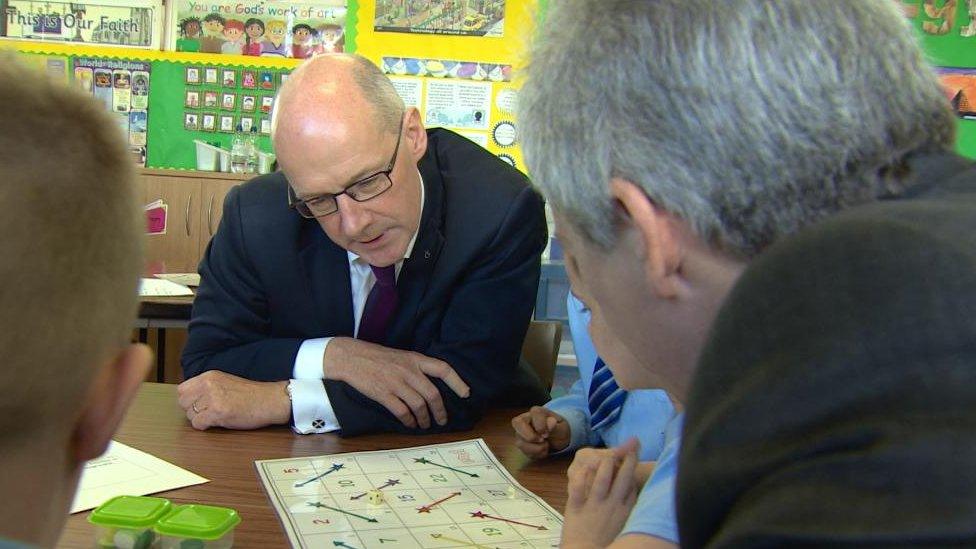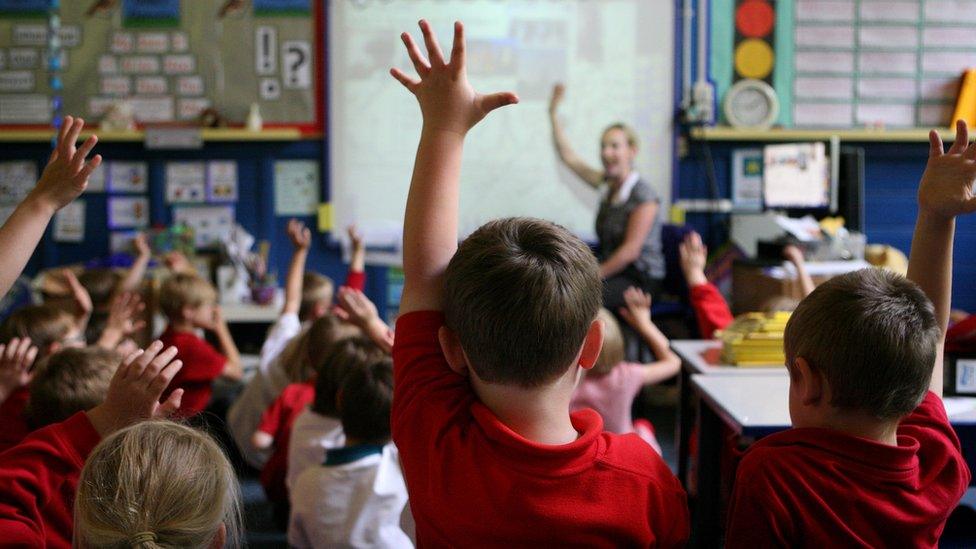Curriculum in schools guidance aims to 'reduce bureaucracy'
- Published

Mr Swinney issued the new guidelines on Monday morning
New guidance on the curriculum in schools has been welcomed by Scotland's largest teachers' union, the EIS.
The statement - stressing the importance of numeracy and literacy - was issued by John Swinney on Monday. It was originally due to be published in time for the start of term.
The education secretary said it was designed to "reduce the burden of bureaucracy" on teachers.
The EIS said turning the "rhetoric into reality" was now the challenge.
The new statement will also provide practical advice for teachers on planning and assessment and is aimed at helping reduce teachers' workload.
It is not expected to have an immediate, direct effect on students, as it it will be up to councils, schools and teachers to work out just how to put much of it into practice.
'Further thinking'
Speaking at the launch of the new guidance at St Roch's Primary and Hearing Impaired School in Glasgow, Mr Swinney said he believed it would make a difference.
"In the short period in which I have been the education secretary, I have been taking measures to simplify and clarify the experience of teachers and reduce the burden of bureaucracy," he said.
"The guidance that we have issued today is designed to do that across the whole of Scottish education.
"I am now working with the assessment and qualifications group to reduce the burden of assessment in the senior sector as well. We are making good progress on those discussions and I will be in a position to set out some further thinking in the weeks to come."

Teaching unions have called for measures to reduce excessive assessment
EIS General Secretary Larry Flanagan welcomed the new guidance but said more had to be done to address excessive assessment workload for pupils and teachers and cut unnecessary bureaucracy.
He added: "We have heard similar statements in the past and progress has often been slow. Turning rhetoric into reality remains the challenge; we need to see concrete change in our schools with clear results, sooner rather than later.
"In particular, the issue of excessive assessment in the senior phase of secondary remains to tackled by both the Scottish government and the SQA."
Declutter the curriculum
Mr Flanagan said classroom teachers also needed to be given more professional autonomy.
"The EIS will be issuing advice to members on how to use these latest publications effectively, in pursuit of our ambitions to declutter the curriculum, reduce the assessment burden and challenge needless paperwork."
In May, following the publication of disappointing figures on numeracy, Mr Swinney said that while Curriculum for Excellence was a success, the importance of the basics like numeracy and literacy mattered.
The statement reaffirms the two key priorities for Curriculum for Excellence are:
Ensuring the best possible progression in literacy, numeracy and health and wellbeing for every child and young person
Closing the attainment gap - the gap between how well youngsters from relatively rich and poor areas do at school
Along with the statement, benchmarks have been published to support learning, teaching and assessment in Literacy and English and Numeracy and Mathematics.
The government said this would streamline existing assessment guidance.
Scottish Conservative education spokeswoman Liz Smith said parents were seeing "lots of warm words" about improving Curriculum for Excellence but "no sign of improving educational standards across the board".
She added: "The SNP's failure to get to grips with our education system is yet another example of a government which has forgotten the day job because of its obsession with independence."
'Pressure on teachers'
Iain Gray, Scottish Labour's education spokesman, welcomed measures to reduce teacher workload but said more was needed than "patronising platitudes".
He added: "The truth is that no warm words from John Swinney or guidance from Education Scotland can substitute for ending SNP cuts to education budgets, or replace the 4,200 teachers we have seen cut from schools.
"Until the SNP are prepared to use the powers of the parliament to provide enough funds to our schools, the pressure on teachers will continue."
Tavish Scott, of the Scottish Liberal Democrats, said the guidance "doesn't tell teachers anything new".
"This was to be the acid test of reducing the paper chase of government guidance affecting teachers," he said. "Yet it appears to tell teachers what they already know."
"Teachers want clarity. Parents want teachers to teach. The Scottish government must redouble their efforts to achieve these objectives."
Ross Greer, the Scottish Greens' education spokesman, said: "Today's guidance is welcome. However, if Scottish ministers are serious about empowering teachers and reducing the attainment gap, they should take their own guidance on board and rethink their approach to national testing."
- Published17 August 2016
